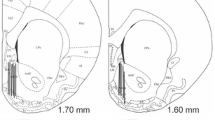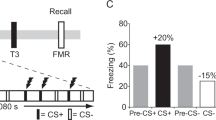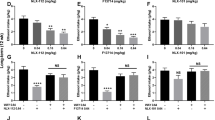Abstract
Mice have been selectively bred for genetic sensitivity (COLD) or insensitivity (HOT) to acute ethanol-induced hypothermia. COLD mice readily develop tolerance to the hypothermic effects of ethanol (EtOH) when it is chronically administered, while HOT mice do not. A number of studies have implicated serotonergic systems in both sensitivity and the development of tolerance to the hypothermic and ataxic effects of EtOH. In the experiments reported here, we administered the serotonin (5HT) neurotoxin 5,7-dihydroxytryptamine (5,7-DHT) to HOT and COLD mice before the acute and chronic administration of equipotent doses of EtOH. 5,7-DHT lesions significantly reduced (by about 65%) whole brain levels of 5HT in both selected lines. This treatment reduced sensitivity to acute EtOH hypothermia in COLD, but not in HOT mice, and blocked the development of tolerance only in COLD mice. Metabolites of 5HT, norepinephrine, and dopamine were generally increased in hypothalamic and brain stem tissue after acute EtOH injection, but HOT and COLD mice were not differentially susceptible to these effects. These results suggest that genes affecting 5HT systems may mediate some of the differences in response to the hypothermic effects of EtOH characterizing HOT and COLD mice.
Similar content being viewed by others
References
Brück K, Zeisberger E (1987) Adaptive changes in thermoregulation and their neuropharmacological basis. Pharmacol Ther 35:163–215
Crabbe JC, Rigter H, Uijlen J, Strijbos C (1979) Rapid development of tolerance to the hypothermic effect of ethanol in mice. J Pharmacol Exp Ther 208:128–133
Crabbe JC, Kosobud A, Tam BR, Young ER, Deutsch CM (1987) Genetic selection of mouse lines sensitive (COLD) and resistant (HOT) to acute ethanol hypothermia. Alcohol Drug Res 7:163–174
Crabbe JC, Phillips TJ, Kosobud A, Belknap JK (1990) Estimation of genetic correlation: Interpretation of experiments using selectively bred and inbred animals. Alcohol Clin Exp Res 14:141–151
Feller DJ, Crabbe JC (1991a) Effect of alcohols and other hypnotics in mice selected for differential sensitivity to the hypothermic actions of ethanol. J Pharmacol Exp Ther 256:947–953
Feller DJ, Crabbe JC (1991b) Effect of receptor-specific drugs in mice selected for differential sensitivity to the hypothermic actions of ethanol. J Pharmacol Exp Ther 256:954–958
Frankel D, Khanna JM, Kalant H, LeBlanc AE (1978) Effect ofp-chlorophenylalanine on the acquisition of tolerance to the hypothermic effects of ethanol. Psychopharmacology 57:239–242
French TA, Weiner N (1991) Serotonergic involvement in ethanol-induced alterations of thermoregulation in long-sleep and short-sleep mice. J Pharmacol Exp Ther 259:833–840
Kalant H, Lê AD (1984) Effects of ethanol on thermoregulation. Pharmacol Ther 23:313–364
Khanna JM, Lê AD, Kalant H, LeBlanc AE (1980) Role of serotonin (5-HT) in tolerance to ethanol and barbiturates. In: Begleiter H (ed) Biological effects of alcohol. Plenum Press, New York, pp 181–195
Lê AD, Khanna JM, Kalant H, LeBlanc AE (1979) Effect of 1-tryptophan on the acquisition of tolerance to ethanol-induced motor impairment and hypothermia. Psychopharmacology 61:125–129
Lê AD, Khanna JM, Kalant H, LeBlanc AE (1980) Effect of 5,7-dihydroxytryptamine on the development of tolerance to ethanol. Psychopharmacology 67:143–146
Lê AD, Khanna JM, Kalant H, LeBlanc AE (1981) Effect of modification of brain serotonin (5-HT), norepinephrine (NE) and dopamine (DA) on ethanol tolerance. Psychopharmacology 75:231–235
Limm M, Crabbe JC (1992) Ethanol tolerance in a genetically insensitive selected mouse line. Alcohol Clin Exp Res 16:800–805
Melchior CL, Tabakoff B (1986) The effect of 5,7- dihydroxytryptamine treatment on the response to ethanol in mice. Pharmacol Biochem Behav 24:955–961
O'Connor CS, Crawshaw LI, Kosobud A, Bedichek RC, Crabbe JC (1989) The effect of ethanol on behavioral temperature regulation in mice. Pharmacol Biochem Behav 33:315–319
O'Connor CS, Crawshaw LI, Crabbe JC (1993) Genetic selection alters thermoregulatory response to ethanol. Pharmacol Biochem Behav (in press)
Phillips TJ, Crabbe JC (1991) Behavioral studies of genetic differences in alcohol action. In: Crabbe JC, Harris RA (eds) The genetic basis of alcohol and drug actions. Plenum Press, New York, pp 25–104
Phillips TJ, Terdal ES, Crabbe JC (1990) Response to selection for sensitivity to ethanol hypothermia: Genetic analyses. Behav Genet 20:473–480
San-Marina A, Khanna JM, Kalant H (1989) Relationship between initial sensitivity, acute tolerance and chronic tolerance to ethanol in a heterogeneous population of Swiss mice. Psychopharmacology 99:450–457
Winer BJ (1971) Statistical principles in experimental design. McGraw-Hill, New York
Wood JM (1980) Effect of depletion of brain 5- hydroxytryptamine by 5,7-dihydroxytryptamine on ethanol tolerance and dependence in the rat. Psychopharmacology 67:67–72
Author information
Authors and Affiliations
Rights and permissions
About this article
Cite this article
Feller, D.J., Young, E.R., Riggan, J.P. et al. Serotonin and genetic differences in sensitivity and tolerance to ethanol hypothermia. Psychopharmacology 112, 331–338 (1993). https://doi.org/10.1007/BF02244929
Received:
Revised:
Issue Date:
DOI: https://doi.org/10.1007/BF02244929




